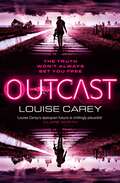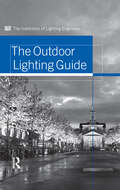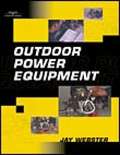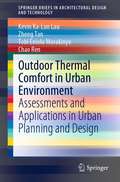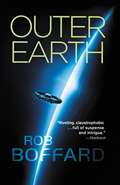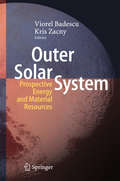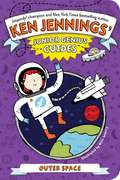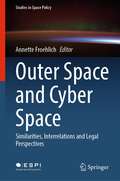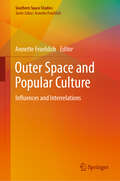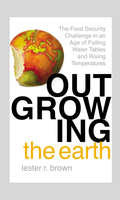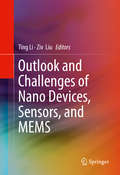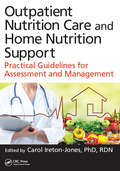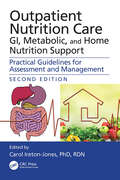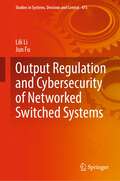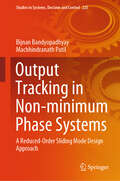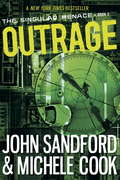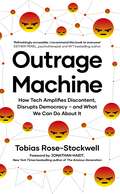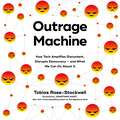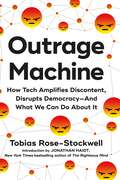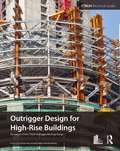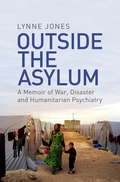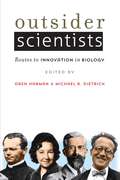- Table View
- List View
Outcast (Inscape)
by Louise CareyTRUTH. LIES. IT CAN BE HARD TO TELL THEM APART.When a bomb goes off at InTech HQ, everything changes for Tanta's corporation. Order becomes disorder. Safety becomes danger. Calm becomes chaos.Tanta is tasked with getting to the bottom of the attack before violence and unrest overtake the city. But even though the evidence points towards rival corporation Thoughtfront, Tanta can't shake the feeling that she's missing something.There's a dark secret at the heart of the case, one that will reveal more about her own corporation than Tanta would like. And the closer Tanta gets to the mystery, the more she comes to realise something terrible: Sometimes facing the truth can be the hardest thing of all.* * * * * * * * * *Praise for Louise Carey's Inscape:'A total blast' Joe Hill'Chillingly plausible' Claire North'Filled with great twists and reveals' SFX
Outcast (Inscape)
by Louise CareyTRUTH. LIES. IT CAN BE HARD TO TELL THEM APART.When a bomb goes off at InTech HQ, everything changes for Tanta's corporation. Order becomes disorder. Safety becomes danger. Calm becomes chaos.Tanta is tasked with getting to the bottom of the attack before violence and unrest overtake the city. But even though the evidence points towards rival corporation Thoughtfront, Tanta can't shake the feeling that she's missing something.There's a dark secret at the heart of the case, one that will reveal more about her own corporation than Tanta would like. And the closer Tanta gets to the mystery, the more she comes to realise something terrible: Sometimes facing the truth can be the hardest thing of all.* * * * * * * * * *Praise for Louise Carey's Inscape:'A total blast' Joe Hill'Chillingly plausible' Claire North'Filled with great twists and reveals' SFX
Outdoor Farm, Indoor Farm
by Lindsay H. MetcalfDiscover how both outdoor and indoor farms sustainably grow the food we eat throughout the year in this vibrant, rhyming picture book.Outdoor farm, tractors toil.Indoor farm,zero soil.With energetic, enchanting verse and sunshiny, colorful illustrations, discover how the food you eat is grown both outside—and inside! Join two children as they explore the inner workings of an outdoor farm and an indoor farm. You&’ll see how a variety of amazing machinery like tractors and drones along with innovative farming techniques yield the wonderful food we all love to enjoy.
Outdoor Lighting Guide
by Institution of Lighting EngineersAs concern grows over environmental issues and light pollution, this book satisfies a need for a straightforward and accessible guide to the use, design and installation of outdoor lighting.This all-inclusive guide to exterior lighting from the Institution of Lighting Engineers, recognized as the pre-eminent professional source in the UK for authoritative guidance on exterior lighting, provides a comprehensive source of information and advice on all forms of exterior lighting, from floodlighting, buildings and road lighting to elaborate Christmas decorations. Useful to practitioners and non-experts alike, specialists will value the dependable detail on standards and related design, installation and maintenance problems, whilst general professionals can find extensive practical guidance on safety issues, the lighting of hazardous areas and avoiding potential difficulties.
Outdoor Power Equipment
by Jay WebsterDesigned to assist students in developing the skills required of professionally certified outdoor power equipment technicians, this book features operation, troubleshooting and service information that can be used to maintain and repair commonly used outdoor equipment, including: lawnmowers and garden tractors, snow throwers, leaf blowers and string trimmers, chain saws, and more! Comprehensive in scope, Small Engines for Outdoor Power Equipment begins by acquainting students with shop safety, tools and basic service information. Following exposure to 'the big picture' of small engine operation, students are then introduced to the specifics of the ignition system, fuel system, governor and throttle control system, lubrication system, cooling and exhaust system, manual starting system, and the electrical starting and charging system. Both two-stroke and four-stroke engines are covered in detail. Small Engines for Outdoor Power Equipment also features step-by-step photo sequences to illustrate service techniques and provides students with an opportunity to 'test' their knowledge by conducting a failure analysis and successfully rebuilding a failed engine.
Outdoor Thermal Comfort in Urban Environment: Assessments and Applications in Urban Planning and Design (SpringerBriefs in Architectural Design and Technology)
by Chao Ren Kevin Ka-Lun Lau Zheng Tan Tobi Eniolu MorakinyoThis book highlights the importance of outdoor thermal comfort for improving urban living quality in the context of urban planning and urban geometry design. It introduces readers to a range of assessment methods and applications of outdoor thermal comfort and addresses urban geometry and thermal environment at the neighbourhood scale using real-world examples and parametric studies. In addition, the subjective evaluations by urban dwellers and numerical modelling tools introduced in this book provide not only a comprehensive assessment of outdoor thermal comfort but also an integrated approach to using thermal comfort indicators as a standard in high-density cities. Given its scope, the book offers a valuable guide for urban climate researchers, urban planners, and designers, and policymakers pursuing more liveable urban environments.
Outer Earth (Outer Earth Ser. #1)
by Rob BoffardWelcome to Outer Earth: a vivid, dangerous world where every day is a desperate struggle for survival. Who said in space no one can hear you scream?Outer Earth is a huge space station orbiting the ruins of our planet. Dirty, overcrowded and inescapable, it's humanity's last refuge . . . and possibly its final resting place.For there are dark forces at work on the station: forces that seek to unleash chaos. If they succeed, there will be nowhere left to run. This omnibus edition contains all three of Rob Boffard's adrenaline-fuelled Outer Earth novels: Tracer, Zero-G, and Impact.
Outer Solar System: Prospective Energy And Material Resources
by Viorel Badescu Kris ZacnyThe Earth has limited resources while the resources in space are virtually unlimited. Further development of humanity will require going beyond our planet and exploring of extraterrestrial bodies and their resources. This book investigates Outer Solar Systems and their prospective energy and material resources. It presents past missions and future technologies and solutions to old problems that could become reality in our life time. The book therefore is a great resource of condensed information for specialists interested in current and impending Outer Solar Systems related activities and a good starting point for space researchers, inventors, technologists and potential investors.
Outer Space (Ken Jennings’ Junior Genius Guides)
by Ken JenningsLet your inner astronaut explore outer space with this interactive trivia book from Jeopardy! champ and New York Times bestselling author Ken Jennings.With this book about space you’ll become an expert and wow your friends and teachers with out-of-this-world facts: Did you know that Mars has a volcano bigger than the state of Arizona? Or that there’s a star with a diamond the size of our moon at its core? With great illustrations, cool trivia, and fun quizzes to test your knowledge, this guide will have you on your way to whiz-kid status in no time!
Outer Space and Cyber Space: Similarities, Interrelations and Legal Perspectives (Studies in Space Policy #33)
by Annette FroehlichThe book analyses a broad range of relevant aspects as the outer space and cyber space domain do not only present analogies but are also strongly interrelated. This may occur on various levels by technologies but also in regard to juridical approaches, each nevertheless keeping its particularities. Since modern societies rely increasingly on space applications that depend on cyber space, it is important to investigate how cyberspace and outer space are connected by their common challenges. Furthermore, this book discusses not only questions around their jurisdictions, but also whether the private space industry can escape jurisdiction by dematerializing the space resource commercial processes and assets thanks to cyber technology. In addition, space and cyberspace policies are analysed especially in view of cyber threats to space communications. Even the question of an extra-terrestrial citizenship in outer space and cyberspace may raise new views. Finally, the interdependence between space and cyberspace also has an important role to play in the context of increasing militarization and emerging weaponization of outer space. Therefore, this book invites questioning the similarities and interrelations between Outer Space and Cyber Space in the same way as it intends to strengthen them.
Outer Space and Popular Culture: Influences and Interrelations (Southern Space Studies)
by Annette FroehlichThis book provides detailed insights into how space and popular culture intersect across a broad spectrum of examples, including cinema, music, art, arcade games, cartoons, comics, and advertisements. This is a pertinent topic since the use of space themes differs in different cultural contexts, and these themes can be used to explore various aspects of the human condition and provide a context for social commentary on politically sensitive issues. With the use of space imagery evolving over the past sixty years of the space age, this is a topic ripe for in-depth exploration. The book also discusses the contrasting visions of space from the late 19th and early 20th centuries and the reality of today, and analyzes space vehicles and habitats in popular depictions of space from an engineering perspective, exploring how many of those ideas have actually been implemented in practice, and why or why not (a case of life imitating art and vice versa). As such, it covers a wide array of relevant and timely topics examining intersections between space and popular culture, and offering accounts of space and its effect on culture, language, and storytelling from the southern regions of the world.
Outgrowing the Earth: The Food Security Challenge in an Age of Falling Water Tables and Rising Temperatures
by Lester R. BrownHistorically, food security was the responsibility of ministries of agriculture but today that has changed: decisions made in ministries of energy may instead have the greatest effect on the food situation. Recent research reporting that a one degree Celsius rise in temperature can reduce grain yields by 10 per cent means that energy policy is now directly affecting crop production. Agriculture is a water-intensive activity and, while public attention has focused on oil depletion, it is aquifer depletion that poses the more serious threat. There are substitutes for oil, but none for water and the link between our fossil fuel addiction, climate change and food security is now clear. While population growth has slowed over the past three decades, we are still adding 76 million people per year. In a world where the historical rise in land productivity has slowed by half since 1990, eradicating hunger may depend as much on family planners as on farmers. The bottom line is that future food security depends not only on efforts within agriculture but also on energy policies that stabilize climate, a worldwide effort to raise water productivity, the evolution of land-efficient transport systems, and population policies that seek a humane balance between population and food. Outgrowing the Earth advances our thinking on food security issues that the world will be wrestling with for years to come.
Outlook and Challenges of Nano Devices, Sensors, and MEMS
by Ting Li Ziv LiuThis book provides readers with an overview of the design, fabrication, simulation, and reliability of nanoscale semiconductor devices, MEMS, and sensors, as they serve for realizing the next-generation internet of things. The authors focus on how the nanoscale structures interact with the electrical and/or optical performance, how to find optimal solutions to achieve the best outcome, how these apparatus can be designed via models and simulations, how to improve reliability, and what are the possible challenges and roadblocks moving forward.
Outpatient Nutrition Care and Home Nutrition Support: Practical Guidelines for Assessment and Management
by Carol Ireton-JonesNutrition, defined by Merriam-Webster, is the process of eating the right kind of food so you can grow properly and be healthy. However, making the right food and nutrition choices and finding the best and most accurate nutrition information can be a challenge, especially when a disease or injury is present. <P><P>There are a wide range of ways that nutrition can be healing, from a simple broth that provides fluids and electrolytes to therapeutic nutrition for diabetes, irritable bowel syndrome, or osteoporosis. Registered Dietitian Nutritionists (RDN) have expertise in disease management and translation of nutrition requirements to foods to consume. However, nutrition care often does not receive the attention in the out-patient setting that is needed to achieve nutrition goals. <P><P>The purpose of this book is to provide pertinent and concise nutrition care information for Registered Dietitian Nutritionists and other professionals working with individuals outside of the hospital including nurses, pharmacists, and physicians. This book covers screening, assessing, and treating malnutrition; out-patient nutrition care in diabetes, cardiovascular disease, gastrointestinal disease, osteoporosis; and home enteral and parenteral nutrition. In each chapter the reader will learn more about the disease process as well as the management of the disease or therapy. <P><P>As the number of patients receiving home care nutrition support increases, proper assessment and management of this therapy is crucial, and clinicians need to practice at an advanced level. This book presents advanced and readily applicable information on proper nutrition care of individuals in the outpatient setting and those receiving home nutrition support.
Outpatient Nutrition Care: Practical Guidelines for Assessment and Management
by Carol Ireton-Jones Berkeley LimketkaiAs the number of patients receiving home care nutrition support increases, proper assessment and management of this therapy is crucial, and clinicians need to practice at an advanced level. This second edition provides practical nutrition care information for professionals working with individuals outside of the hospital including registered dietitians, nurses, pharmacists, and physicians. It covers screening, assessing, and treating malnutrition; outpatient nutrition care in diabetes, cardiovascular disease, gastrointestinal disease, and home enteral and parenteral nutrition. Each chapter describes the disease process as well as the management of the disease or therapy. Key Features Presents practical information on proper nutrition care of individuals in the outpatient setting and those receiving home nutrition support New information on GI tests and procedures; gastroparesis/pancreatitis, parenteral lipids, and bariatric surgery Expanded chapter on short bowel syndrome and malabsorptive disorders Additional information on feeding options including an overview of oral, oral supplements, and enteral and parenteral nutrition Teaches the user additional information on disease processes as well as the management of the disease or therapy
Output Regulation and Cybersecurity of Networked Switched Systems (Studies in Systems, Decision and Control #475)
by Jun Fu Lili LiNetworked switched system has emerged as an essential system model in the field of control due to its accurate reflection of the wide-area distribution and typical switching characteristics of increasingly sophisticated controlled objects in engineering practice. The openness of communication networks, the limitation of communication resources, and the complexity of switching behaviors make it a challenging task to ensure the steady-state and transient performance of the output regulation of networked switched systems. This book proposes several novel methodologies for output regulation of networked switched systems from the perspective of both steady-state and transient performance. The core features of our approaches are fourfold: i) Without imposing stability requirements on individual subsystems and all switching instants, a series of innovative dwell-time switching technologies are established to handle the issue of output regulation for networked switched systems with severely unstable dynamics under event-triggering strategies in the presence of cyber attacks. ii) Taking into account switching rules and cyber attack parameters within the event-triggered control framework, event detection conditions, modal matching conditions, and event waiting conditions are constructed, and a series of new event-triggering mechanisms are proposed to effectively enhance network resource utilization and secure steady-state performance of networked switched systems. iii) Typical cyber attacks have unique consequences on the secure steady-state performance of networked switched systems with severely unstable dynamics due to the short activation time of a single subsystem and the necessity to relay the switching signal through the network. To this purpose, the consecutive asynchronous switching behaviors of the subsystem or controller resulting from a long-duration DoS attack or an integrity deception attack incorporating switching signal tampering are investigated. iv) To deal with the transient performance fluctuations of the closed-loop system caused by factors such as mismatch switching between the subsystem and the corresponding controller, data update at event-triggering instants, cyber attack blocking and tampering of transmitted data, etc., bumpless transfer control strategies are formulated in the interpolation type and multi-source type, balancing the transient and steady-state performances of the output regulation of networked switched systems. This book presents these topics in a systematic way, which is of tremendous importance to both theoretical research and practical applications involving switched systems.
Output Tracking in Non-minimum Phase Systems: A Reduced Order Sliding Mode Design Approach (Studies in Systems, Decision and Control #225)
by Bijnan Bandyopadhyay Machhindranath PatilThis book focuses on the systematic design of reduced-order sliding mode output tracking control for non-minimum phase systems. It presents a systematic method for the design of reduced order control law for a wide variety of systems. The target audience primarily comprises research experts in control theory, but the book may also be beneficial for graduate students.
Outrage (The Singular Menace, #2)
by John Sandford Michele CookJohn Sandford and Michele Cook follow up their New York Times bestseller, UNCAGED, with the next nail-biting installment in The Singular Menace series. Perfect for fans of The Maze Runner! Shay Remby and her gang of renegades have struck a blow to the Singular Corporation. When they rescued Shay's brother, Odin, from a secret Singular lab, they also liberated a girl. Singular has been experimenting on her, trying to implant a U.S. senator's memories into her brain--with partial success. Fenfang is now a girl who literally knows too much. Can the knowledge brought by ex-captives Odin and Fenfang help Shay and her friends expose the crimes of this corrupt corporation? Singular has already killed one of Shay's band to protect their secrets. How many more will die before the truth is exposed?From the Hardcover edition.
Outrage Machine: How Tech Amplifies Discontent, Disrupts Democracy – and What We Can Do About It
by Tobias Rose-StockwellForeword by Jonathan Haidt, author of THE RIGHTEOUS MINDAn invaluable guide to understanding the technology that captures our attention with anger.The original internet was not designed to make us upset, distracted, confused, and outraged. But something unexpected happened at the turn of the last decade, when a handful of small features were quietly launched at social media companies with little fanfare. Together, they triggered a cascading set of dramatic changes to how media, politics, and society itself operates-inadvertently creating an Outrage Machine we cannot ignore.Author, designer, and media researcher Tobias Rose-Stockwell shares the defining shifts caused by these technologies, and how they have ignited a society-wide crisis of trust. Drawing from cutting-edge research and vivid personal anecdotes, Rose-Stockwell illustrates how social media has bound us to an unprecedented system of public performance, training us to react rather than reflect, and attack rather than debate.OUTRAGE MACHINE reveals the triggers and tactics used to exploit our anger, unpacking how these tools hack our deep tribal instincts and psychological vulnerabilities, and how they have become opportunistic platforms for authoritarians and a threat to democratic norms everywhere.But this book is not just about the problem. In a story spanning continents and generations, Rose-Stockwell explores how every new media technology disrupts our ability to make sense of the world, from the printing press to the telegraph, from radio to television. OUTRAGE MACHINE situates social media within a historical cycle of confusion, violence, and emerging tolerance. Using clear language and powerful illustrations, this book reveals the magnitude of the challenges we face, while offering realistic solutions and a promising pathway out.
Outrage Machine: How Tech Amplifies Discontent, Disrupts Democracy – and What We Can Do About It
by Tobias Rose-StockwellForeword by Jonathan Haidt, author of THE RIGHTEOUS MINDAn invaluable guide to understanding the technology that captures our attention with anger.The original internet was not designed to make us upset, distracted, confused, and outraged. But something unexpected happened at the turn of the last decade, when a handful of small features were quietly launched at social media companies with little fanfare. Together, they triggered a cascading set of dramatic changes to how media, politics, and society itself operates-inadvertently creating an Outrage Machine we cannot ignore.Author, designer, and media researcher Tobias Rose-Stockwell shares the defining shifts caused by these technologies, and how they have ignited a society-wide crisis of trust. Drawing from cutting-edge research and vivid personal anecdotes, Rose-Stockwell illustrates how social media has bound us to an unprecedented system of public performance, training us to react rather than reflect, and attack rather than debate.OUTRAGE MACHINE reveals the triggers and tactics used to exploit our anger, unpacking how these tools hack our deep tribal instincts and psychological vulnerabilities, and how they have become opportunistic platforms for authoritarians and a threat to democratic norms everywhere.But this book is not just about the problem. In a story spanning continents and generations, Rose-Stockwell explores how every new media technology disrupts our ability to make sense of the world, from the printing press to the telegraph, from radio to television. OUTRAGE MACHINE situates social media within a historical cycle of confusion, violence, and emerging tolerance. Using clear language and powerful illustrations, this book reveals the magnitude of the challenges we face, while offering realistic solutions and a promising pathway out.
Outrage Machine: How Tech Amplifies Discontent, Disrupts Democracy—And What We Can Do About It
by Tobias Rose-StockwellAmazon's Best History Book of the Month for July 2023An invaluable guide to understanding how the internet has broken our brains—and what we can do to fix it. The original internet was not designed to make us upset, distracted, confused, and outraged. But something unexpected happened at the turn of the last decade, when a handful of small features were quietly launched at social media companies with little fanfare. Together, they triggered a cascading set of dramatic changes to how media, politics, and society itself operate—inadvertently creating an Outrage Machine we cannot ignore. Author, designer, and media researcher Tobias Rose-Stockwell shares the defining shifts caused by these technologies, and how they have ignited a society-wide crisis of trust. Drawing from cutting-edge research and vivid personal anecdotes, Rose-Stockwell illustrates how social media has bound us to an unprecedented system of public performance, training us to react rather than reflect, and attack rather than debate.Outrage Machine reveals the triggers and tactics used to exploit our anger, unpacking how these tools hack our deep tribal instincts and psychological vulnerabilities, and how they have become opportunistic platforms for authoritarians and a threat to democratic norms everywhere. But this book is not just about the problem. In a story spanning continents and generations, Rose-Stockwell explores how every new media technology disrupts our ability to make sense of the world, from the printing press to the telegraph, from radio to television. Outrage Machine situates social media within a historical cycle of confusion, violence, and emerging tolerance. Using clear language and powerful illustrations, this book reveals the magnitude of the challenges we face, while offering realistic solutions and a promising pathway out.
Outrigger Design for High-Rise Buildings: An Output Of The Ctbuh Outrigger Working Group
by Hi Sun Choi Goman Ho Leonard Joseph Neville Mathias CtbuhOutrigger systems are rigid horizontal structures designed to improve a building’s stability and strength by connecting the building core or spine to distant columns, much in the way an outrigger can prevent a canoe from overturning. Outriggers have been used in tall, narrow buildings for nearly 500 years, but the basic design principle dates back centuries. In the 1980s, as buildings grew taller and more ambitious, outrigger systems eclipsed tubular frames as the most popular structural approach for supertall buildings. Designers embraced properly proportioned core-and-outrigger schemes as a method to offer far more perimeter flexibility and openness for tall buildings than the perimeter moment or braced frames and bundled tubes that preceded them. However, the outrigger system is not listed as a seismic lateral load-resisting system in any code, and design parameters are not available, despite the increasingly frequent use of the concept. The Council on Tall Buildings and Urban Habitat’s Outrigger Working Group has addressed the pressing need for design guidelines for outrigger systems with this guide, a comprehensive overview of the use of outriggers in skyscrapers. This guide offers detailed recommendations for analysis of outriggers within the lateral load-resisting systems of tall buildings, for recognizing and addressing effects on building behavior and for practical design solutions. It also highlights concerns specific to the outrigger structural system such as differential column shortening and construction sequence impacts. Several project examples are explored in depth, illustrating the role of outrigger systems in tall building designs and providing ideas for future projects. The guide details the impact of outrigger systems on tall building designs, and demonstrates ways in which the technology is continuously advancing to improve the efficiency and stability of tall buildings around the world.
Outside the Asylum: A Memoir of War, Disaster and Humanitarian Psychiatry
by Lynne Jones'A profound memoir' Daily Telegraph'As revealing as the writing of Oliver Sacks' Mark CousinsOutside the Asylum is Lynne Jones's personal and highly acclaimed exploration of humanitarian psychiatry and the changing world of international relief. Her memoir graphically describes her experiences in war zones and disasters around the world, from the Balkans and 'mission-accomplished' Iraq, to tsunami-affected Indonesia, post-earthquake Haiti and 'the Jungle' in Calais.
Outside the Asylum: A Memoir of War, Disaster and Humanitarian Psychiatry
by Lynne JonesWhat happens if the psychiatric hospital in which you have lived for ten years is bombed and all the staff run away? What is it like to be a twelve-year-old and see all your family killed in front of you? Is it true that almost everyone caught up in a disaster is likely to suffer from post-traumatic stress disorder? What can mental health professionals do to help? How does one stay neutral and impartial in the face of genocide? Why would a doctor support military intervention?Outside the Asylum is Lynne Jones's personal exploration of of humanitarian psychiatry and the changing world of international relief; a memoir of more than twenty-five years as a practising psychiatrist in war and disaster zones around the world. From her training in one of Britain's last asylums, to treating traumatised soldiers in Gorazde after the Bosnian war, helping families who lost everything in the earthquake in Haiti, and learning from traditional healers in Sierra Leone, Lynne has worked with extraordinary people in extraordinary situations. This is a book that shines a light on the world of humanitarian aid, and that shows us the courage and resilience of the people who have to live, work and love in some of the most frightening situations in the world.
Outsider Scientists: Routes to Innovation in Biology
by Oren Harman Michael R. DietrichOutsider Scientists describes the transformative role played by "outsiders" in the growth of the modern life sciences. Biology, which occupies a special place between the exact and human sciences, has historically attracted many thinkers whose primary training was in other fields: mathematics, physics, chemistry, linguistics, philosophy, history, anthropology, engineering, and even literature. These outsiders brought with them ideas and tools that were foreign to biology, but which, when applied to biological problems, helped to bring about dramatic, and often surprising, breakthroughs. This volume brings together eighteen thought-provoking biographical essays of some of the most remarkable outsiders of the modern era, each written by an authority in the respective field. From Noam Chomsky using linguistics to answer questions about brain architecture, to Erwin Schrödinger contemplating DNA as a physicist would, to Drew Endy tinkering with Biobricks to create new forms of synthetic life, the outsiders featured here make clear just how much there is to gain from disrespecting conventional boundaries. Innovation, it turns out, often relies on importing new ideas from other fields. Without its outsiders, modern biology would hardly be recognizable.
